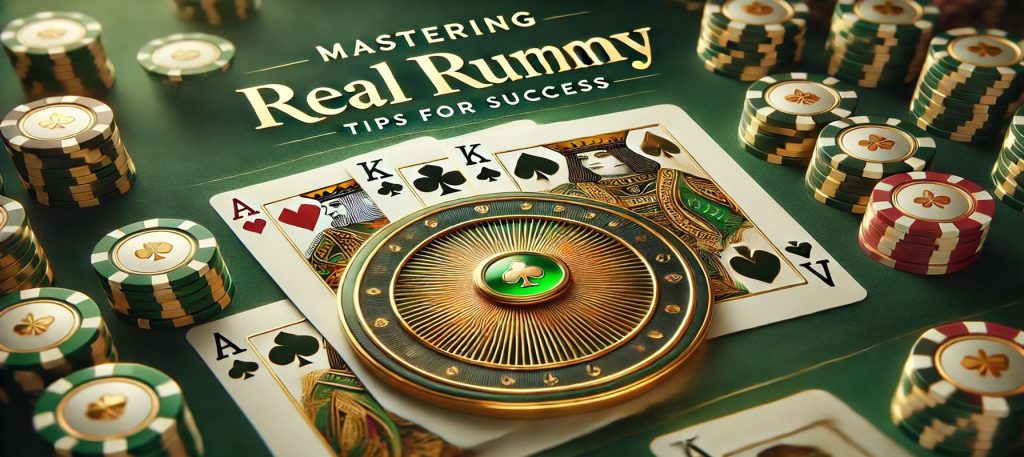Description

A Complete Guide to Mastering Rummy Rummy is a timeless card game that has enthralled players for many years. Because it combines strategy, skill, & a little bit of luck, it’s a fun hobby for both serious competitors and casual players. Anyone hoping to fully enjoy the game of rummy must have a basic understanding of the game.
Rummy’s basic objective is to merge all of your cards before your opponents do, which is accomplished by creating sets and runs from a hand of cards. For example, a run is a series of three or more cards in the same suit, whereas a set is three or four cards of the same rank but different suits. The game has multiple versions, each with its own distinct rules and subtleties, and it can be played with two or more players.
Players are dealt a set number of cards to start playing rummy; depending on the variation, this number is usually seven or ten. One face-up card initiates the discard pile, while the remaining cards form a draw pile. After taking turns drawing from the draw or discard pile, each player discards one card from their hand. Until a single player successfully melds every card in their deck, the other players reveal their hands and begin calculating points using the unmelded cards. Since they lay the groundwork for more complex strategies and tactics that can result in victory, an understanding of these basic mechanics is essential for building a strong foundation in rummy.
Understanding the fundamentals of rummy is the first step towards creating a winning strategy that will help you outplay your rivals. A proficient Rummy player needs to be flexible because the cards dealt and other players’ moves can change the difficulty of each game. Focusing on creating melds as fast as you can while monitoring what your opponents are gathering is one smart tactic.
By discarding cards that your opponents might need, you can disrupt their plans in addition to working toward your own winning hand. Effective hand management is another crucial component of rummy strategy. In addition to creating melds, this also entails selecting which cards to keep and which to discard. It can be dangerous to hold onto high-point cards if you can’t meld them because if someone else declares first, they can greatly raise your score. As a result, early in the game, it’s usually a good idea to concentrate on melding lower-point cards while watching for possible high-value combinations. To succeed in this fast-paced card game, you must strike a balance between managing your hands & being aware of your opponents’ tactics.
The strategic use of discards is a key component of rummy, influencing both the game’s flow & each player’s strategy. The Value of Careful Disposal. A player’s opponents can learn important details about their hand composition and possible melds each time they discard a card. Discarding a card that another player might need can unintentionally help them form their melds, so it’s important to be careful what you discard. Information Gathering from the Discards of Opponents.
On the other hand, monitoring the plays your opponents are discarding can help you make better decisions about your own plays and provide insights into their tactics. Also, strategic discarding can be used as a defensive strategy. defensively discarding and interfering with the advancement of opponents. It may be advantageous to keep cards that could finish their melds while discarding less useful ones if you observe that an opponent is collecting particular cards or suits. This strategy impedes your opponents’ progress in addition to protecting your own hand. You can improve your overall strategy and raise your winning chances by acknowledging the significance of discards and applying a careful approach to this part of the game.
Two strong Rummy tools that can drastically change the game’s dynamics are jokers and wild cards. These cards are very flexible when creating melds because they can be used in place of any other card. You can significantly outperform your opponents if you know how to use these wild cards. A joker, for example, can help you finish that meld and possibly declare victory earlier than you would have otherwise if you have a run that is only one card short.
But it’s crucial to use jokers sparingly. If another player declares before you do, it can be harmful to hold onto them for too long, even though they can speed up the formation of melds. Also, take into account how your use of jokers might affect your opponents’ strategies; if they witness you completing a meld with a joker, they might modify their moves accordingly.
Therefore, even though jokers are useful tools in rummy, using them effectively calls for careful thought & preparation. In Rummy, it’s critical to pay close attention to your opponents’ moves because this enables you to predict their tactics and modify your play accordingly. One can learn more about their hand composition and possible melds they are aiming for by observing which cards they draw and discard. An opponent is probably attempting to form a run or set with the cards if, for instance, they routinely remove cards from the discard pile that are part of a particular suit or rank.
You can decide which cards to keep or throw away for yourself more intelligently if you are aware of these trends. Also, you can determine when your opponents might be about to declare victory by monitoring their movements. An opponent may be almost finished with their melds if you observe that they have been dropping cards quietly or have started picking them up quickly. In these situations, playing more defensively & holding onto cards that might help them finish their hands might be wise.
Throughout the game, you can improve your strategy and raise your chances of winning by staying aware of what your opponents are doing. In rummy, declaring is a crucial move that can affect how the game turns out. Knowing the current state of play and carefully evaluating your hand are necessary to determine when to declare.
A typical error made by inexperienced players is to declare too soon before fully optimizing their hand. Before making this move, you must make sure you have formed all the necessary melds. If you don’t, you run the risk of holding high-point unmelded cards that could result in a costly declaration by another player.
When it comes to Rummy declaring, timing is crucial. You can exert pressure on your opponents & possibly surprise them by waiting for the ideal time to declare if you think you have a strong hand and have been watching them carefully. To reduce the amount of money you could lose from unmelded cards in your hand, it might be prudent to declare sooner rather than later if you think your opponent is about to do so. In the end, becoming proficient at declaring calls for experience, practice, & the capacity to accurately read the dynamics of the game.
Effective hand management is essential for rummy success. Throughout the game, players draw & discard cards, so keeping your hand organized can help you make decisions more quickly. Putting Your Hand in Order. Sorting your cards according to suit or rank is a useful strategy that makes it simpler to quickly spot possible melds.
Because of this arrangement, you can rapidly determine which cards are best to keep and which ones should be thrown away. Adjusting to the Game. Taking the initiative to reshape your hand as the game goes on is essential to increasing your winning chances. Consider throwing away cards that you are holding onto that are no longer useful for creating melds, even if they are low-point cards.
This will make room for more beneficial draws from the deck. Maintaining Flexibility. Staying adaptable & responsive throughout the game can be achieved by routinely reevaluating your hand in light of what you see from your opponents. You set yourself up for more success in rummy by effectively managing your hand and making adjustments as necessary. Rummy is a card game that requires practice to become proficient. Your ability to identify patterns, create strategies, & make snap decisions under duress will improve with increased play.
Interacting with different players can also introduce you to different tactics and styles of play, which can improve your comprehension of the game. Participating in online tournaments or playing rummy casually with friends, every experience helps you improve as a player. Consider reading books or watching online tutorials on rummy tactics & strategies in addition to playing the game on a regular basis.
Observing seasoned players or analyzing professional games can yield insightful information about sophisticated strategies that might not be immediately obvious in casual play. Also, you can greatly speed up your learning process by reviewing your own gameplay after each session and identifying any errors or areas that need work. You will surely improve your Rummy skills and have more success at the table if you put in the time and effort to practice and better yourself.
In summary, learning Rummy necessitates a combination of comprehending its basic principles and creating strategic plans based on one’s own playstyle and the actions of opponents. Players may greatly improve their gameplay experience & raise their chances of winning by concentrating on important elements like discards, jokers, monitoring the movements of opponents, determining when to declare, effectively managing hands, & practicing. These ideas will be helpful aids on your path through the fascinating world of rummy, regardless of your level of experience or desire to become an expert.



